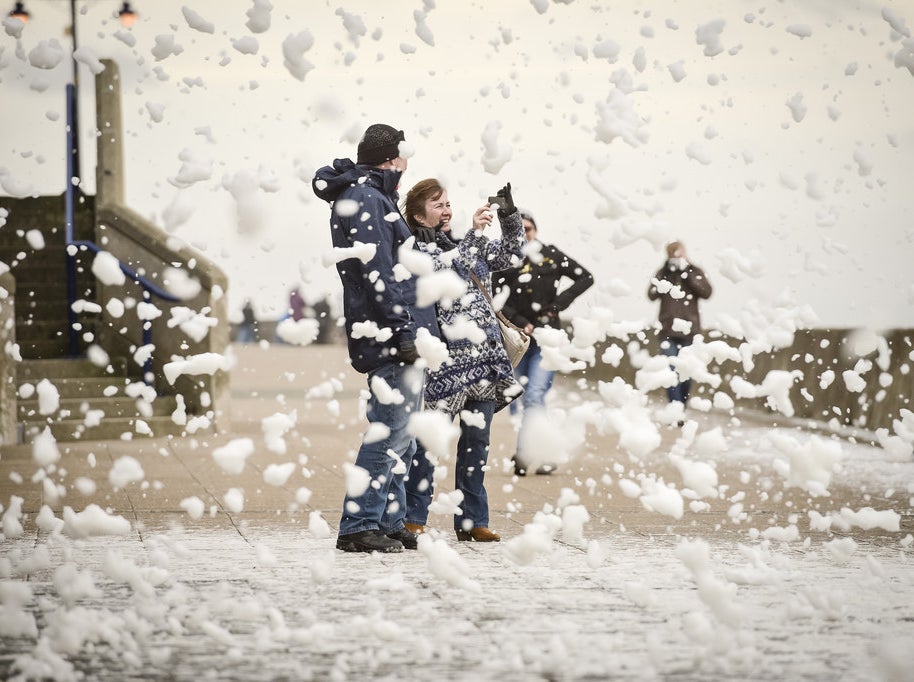The prime minister chaired a COBR meeting on Monday morning to tackle the aftermath of Storm Desmond, which saw more than 2,000 homes and businesses flooded, and left over 4,000 without power in northwest England this weekend.
Later on Monday, David Cameron will visit areas of the UK that have been "badly hit" by flooding.
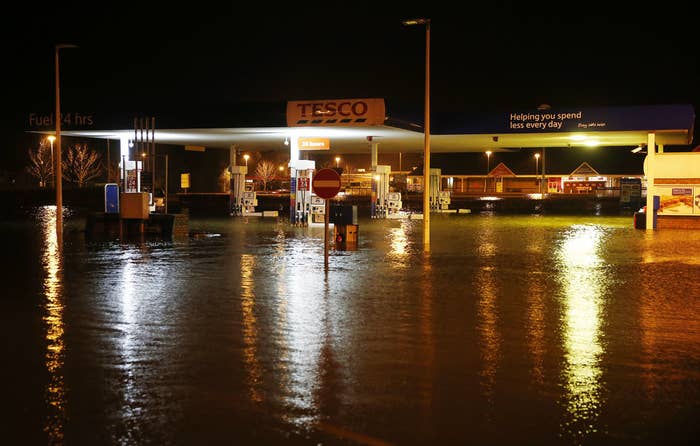
Roughly £45 million has already been spent on flood defences in Cumbria.
Environment secretary Elizabeth Truss confirmed today that this parliament will be spending a further £2.3 billion on flood defences across the country.
In a statement released on Monday morning Truss said that the "unprecedented levels of rainfall mean that the water in some areas has risen to levels never seen before".
"That has meant that while flood defences have delayed and reduced the impact, we have seen some water overtopping defences in places," Truss said.
"This morning I chaired a COBR meeting, ensuring that every possible resource is available to the emergency services and responders on the ground."
Truss will be making a statement this afternoon about the lessons to be learned after flood defences were breached in some parts of northern England.

One of the most famous cliffs in the Yorkshire Dales became a waterfall for the "first time in living memory" following the aftermath of Storm Desmond, the BBC reported.
On Sunday morning Stuart Gledhill filmed the moment water flowed over Malham Cove, briefly making it England's highest unbroken waterfall. The video footage has been viewed over 100,000 times.
Speaking to the BBC Gledhill said that cave divers had surveyed the waterfall drop earlier this year.
"It was found to be 70.06m (230ft), making it briefly the highest single-drop waterfall in England above ground," he said.
England’s newest & highest waterfall #malhamcove @yorkshire_dales #yorkshire Credit: Richard Smith @itvcalendar
The prime minister said in a statement yesterday that the thoughts of the whole country are with those affected by the devastating weather.
"The Government is doing everything it can to help those who have seen their homes flooded - and to try and prevent further damage," Cameron said.
He thanked emergency workers and troops who had worked tirelessly to respond to the weekend's events, adding that "there has been a tremendous response from local communities too, with people taking in families affected by the flooding."
The Met Office confirmed that record levels of rain fell over 24 hours in Cumbria, a total of 341.4mm. Police in the area said that flood defences were "overtopping", with a large quantity of water in Carlisle town centre.
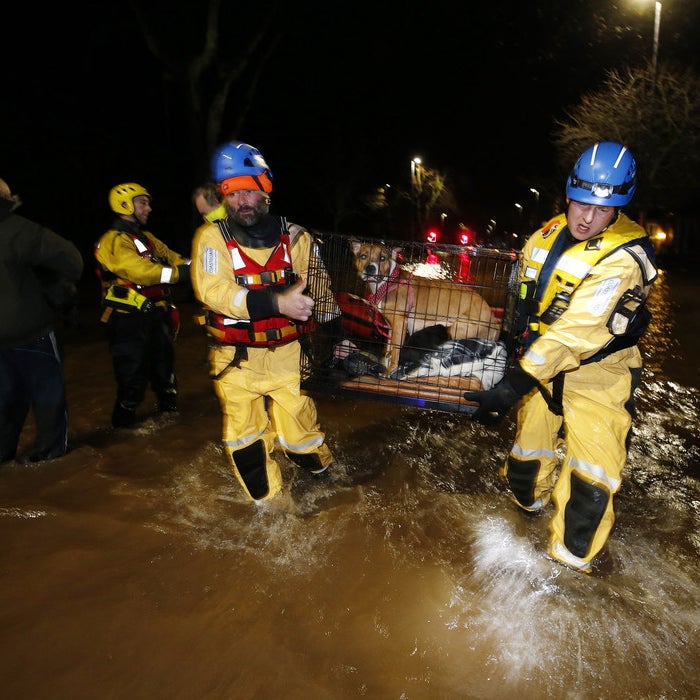
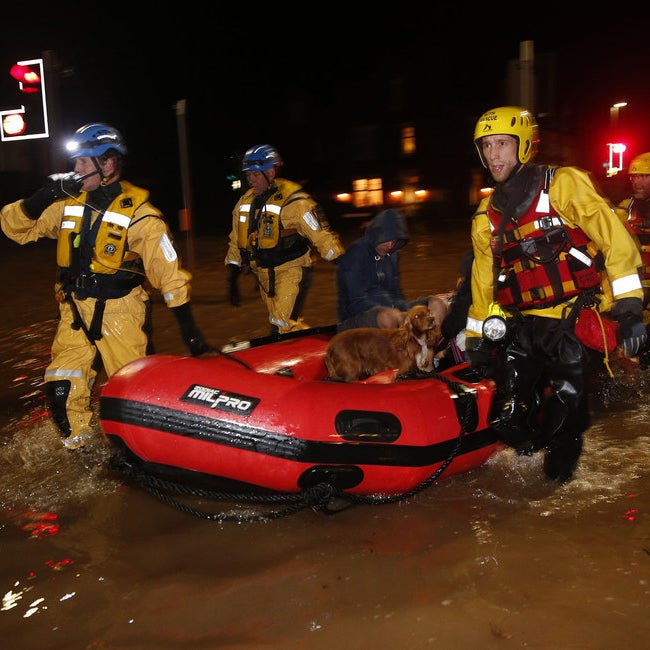
Dogs are rescued by the coastguard on Warwick Road in the centre of Carlisle.
Police were called at 10.01am on Sunday morning following reports that an elderly man had fallen into a river.
On Monday afternoon Cumbria police confirmed that the body of a male was recovered from a tributary running into the River Kent, in the Staveley area.
A formal identification is yet to take place.
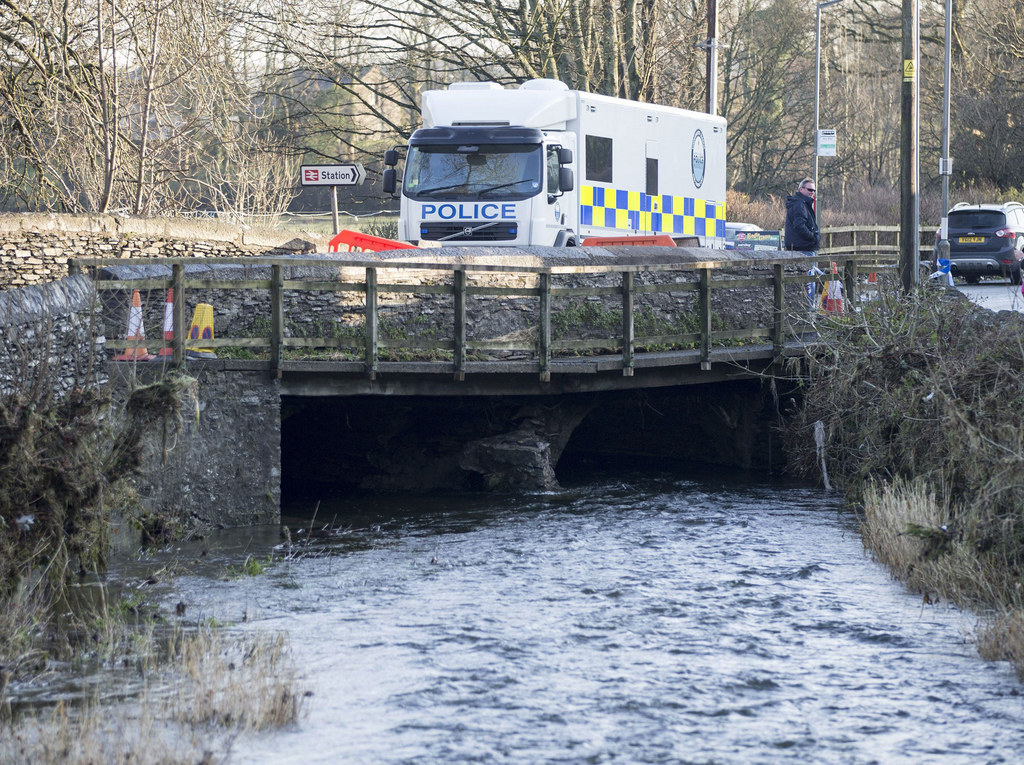
Mountain rescue teams were deployed in Keswick and Appleby in the region after seeing some of the heaviest rainfall. As much as 178mm of rain was reported overnight, more than was recorded for the whole of December in the region in 2014.
The International Rescue Corps, usually called upon to respond to natural disasters abroad, confirmed it had sent 14 members, five boats, and two ambulances to assist rescue efforts.
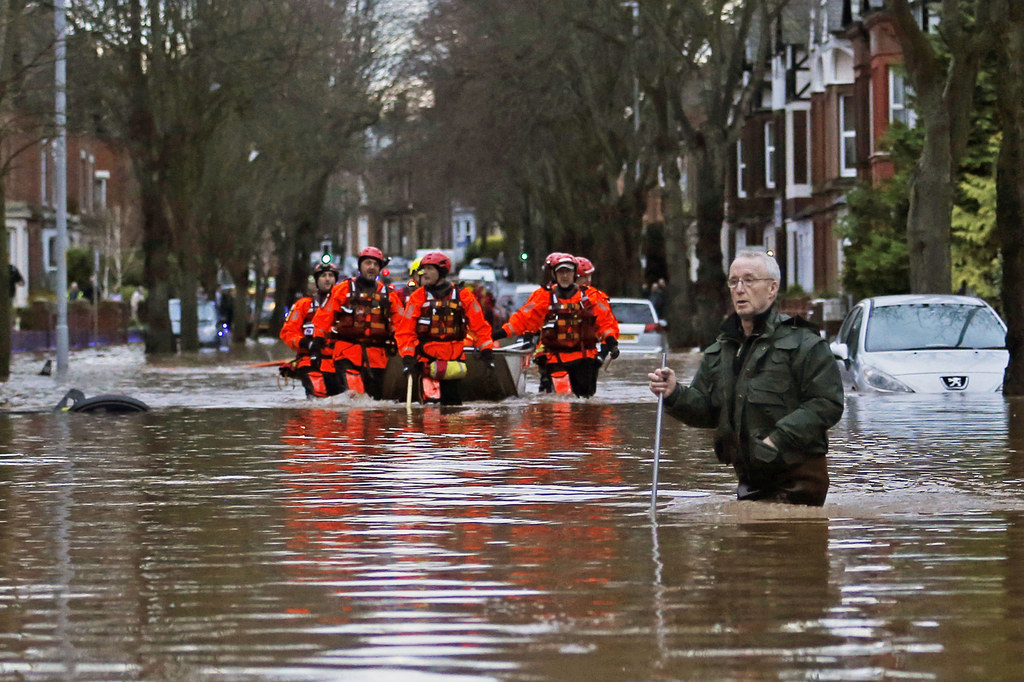
In Carlisle, a city that has suffered severe flooding on many occasions over the last decade, BBC North of England correspondent Danny Savage said the conditions were the worst he'd seen since 2005.
Reporting from the city's Warwick Road on Sunday, he said:
The army is here to help, after the police went wading door to door in the early hours making sure residents were at least safe.
Later, rescue teams with boats arrived to move those people who did want to leave. Thousands of properties are without electricity – a hospital in Lancaster is running on generator power and there are worries about a substation in Carlisle.
Residents are being told to keep phones fully charged now – if that substation goes, 60,000 properties could be left without power.


Emergency workers use a boat in floodwater on Warwick Road in Carlisle.
Military vehicle just turned onto Stanhope Road from Wigton Road #cumbriaflood @BBC_Cumbria

The fall of rain had quelled significantly as Sunday lunchtime approached, and the Met Office issued no weather warnings.
Flood warnings remained in place throughout large parts of the UK and Scotland, however, as rain-saturated ground allowed flooding to persist.
In 56 areas of England, and two areas of Scotland, floods were considered severe enough to pose a danger to life.
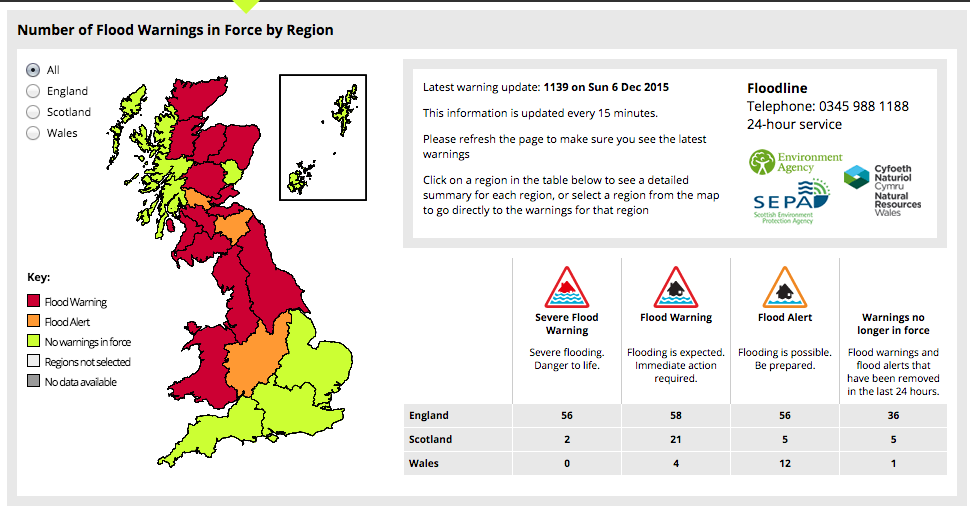
National Rail reported "major disruptions" to routes throughout northern England on Sunday.
Virgin train services between Carlisle and Preston were cancelled completely until further notice.
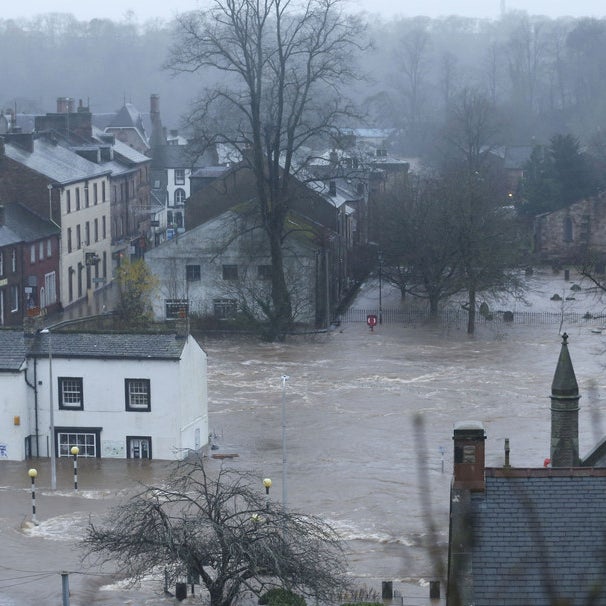
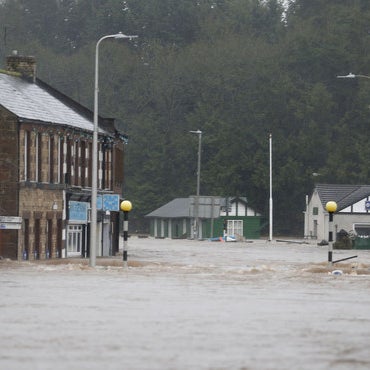
Severe weather warnings were in place from Saturday afternoon as Storm Desmond brought gale-force winds and heavy rain to batter large parts of the UK.
The Met Office issued a red severe weather warning – the highest on its scale – in the northwest of England and Scotland, urging people not to travel.
The worst flooding was reported in the Lake District and Scotland but powerful winds were reported across the country with the strongest gusts, of 85 mph, recorded in Snowdonia in North Wales.
Sofa floats down flooded street in Appleby, Cumbria. Latest #StormDesmond updates: https://t.co/c20Q9F5VwI https://t.co/XiPvu4k0wB
In London, the Met police said an elderly man died after a gust of wind pushed him into the path of an oncoming bus.
In a statement officers said the 90-year-old man was pronounced dead at the scene on Saturday at about 1:15pm.
"Enquiries continue to establish the circumstances. At this early stage, officers believe the man was caught by a gust of wind and blown off the pavement against the side of a moving bus," the statement said.
The man's next of kin have been informed. Formal identification and a post-mortem examination will take place in due course.

The Met Office's chief forecaster warned rain in "excess of 150mm" was expected in Cumbria and parts of the Borders could expect 60mm of rain.
As darkness began to fall late on Saturday afternoon, police in Cumbria declared a major incident and advised some residents to evacuate as many roads were reported to be blocked by flooding and heavy surface water.
Residents in parts of Appleby and Keswick were among those evacuated from their homes, while others in the area were encouraged to seek alternative accommodation with family or friends.
RED warning for #rain has been extended to parts of Scotland https://t.co/TmvTfmDfrK #StormDesmond #alert
"Due to the current weather conditions being experienced across Cumbria, the emergency services are experiencing a high number of flooding-related calls. These include a number of rescues of people from vehicles stuck in flood water," Assistant Chief Constable Andy Towler said on Sunday.
"Apart from the obvious risk to members of the public, the abandoned vehicles are then causing considerable problems for emergency services when travelling around the county."

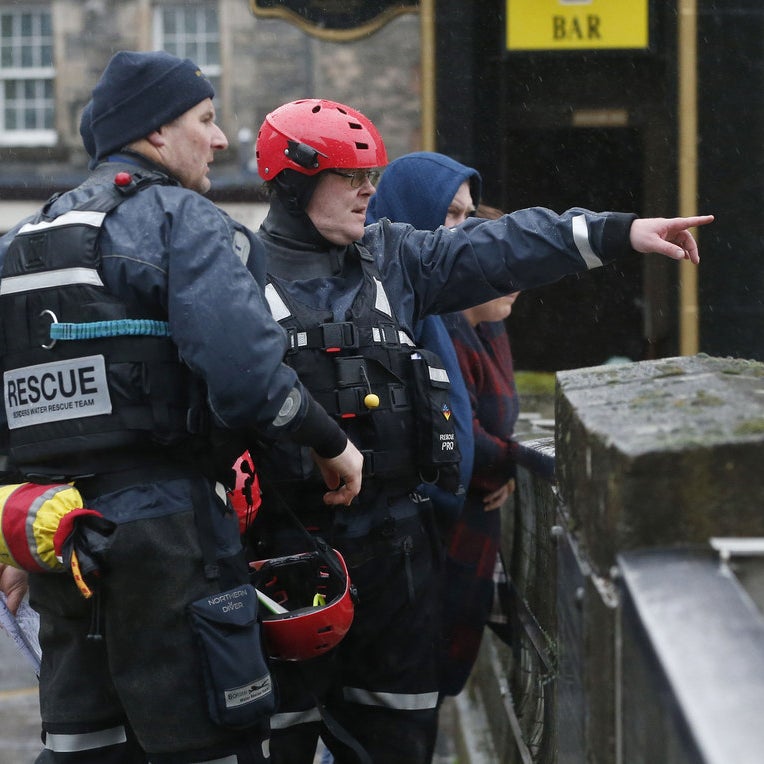
Train services across the northeast were also affected by flooding. National Rail said all services between Preston and Carlisle were suspended, stranding many commuters.
"Flooding and a landslip between Preston and Carlisle means that First TransPennine Express, Northern Rail, and Virgin Trains services are unable to run north of Preston. Replacement road transport has been in place, however this is no longer able to run because of the severe weather conditions," National Rail said in a statement.
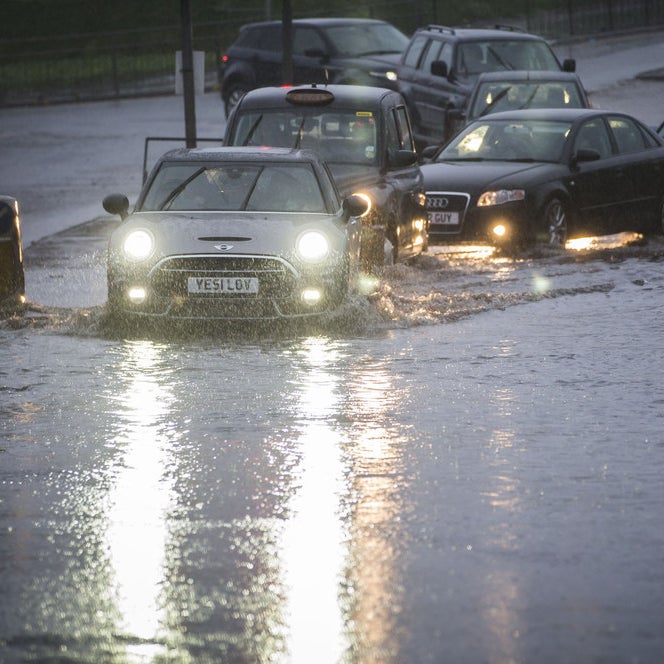
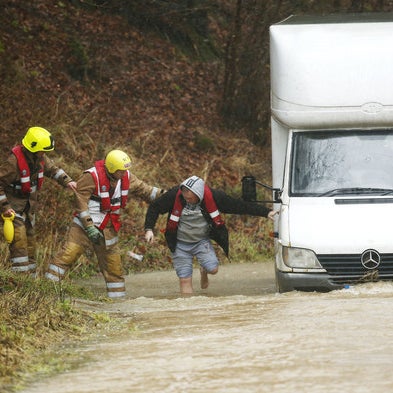
Many other areas of Scotland, northeast England, and Yorkshire faced an amber weather warning during the weekend as heavy rains persisted.
Gusts of up to 80mph were expected in the northeast, while police closed a busy street in Glasgow after gale-force winds blew the roof off a cinema.
A sheet of metal thought to have come loose from the roof of Cineworld on the city's Renfield Street narrowly missed pedestrians and vehicles below, the Daily Record reported.
Valley completed flooded. Sheep safe on higher ground. Take care downstream - this is getting worse #floods
Not sure I have ever seen it worse than this, and still raining hard.
In Scotland, 80 flood warnings were issued, according to the BBC, with red weather warnings for rain in Hawick and Newcastleton.
"The situation in Hawick developed overnight, but given the potential impact of the rising river levels it was imperative that residents were evacuated as early as possible, and they are now being looked after within the rest centre," Scottish Borders Council emergency planning officer Jim Fraser said.
Lake Windermere at Ambleside #StormDesmond
"The Met Office is advising that the Borders will be on the end of very heavy and persistent rainfall throughout today and there is the potential for significant disruption across the region and river levels will continue to rise.
"This will present very challenging conditions and members of the public are strongly advised to prepare for this and take the necessary action where they can."
